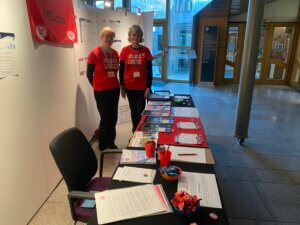‘Meet the Scientists’ is a new series, interviewing researchers around the world working on ME and chronic fatigue syndrome.
The purpose is to hear about current research directly from scientists and meet the people who are doing such important work to improve our health. The series will introduce early career researchers through to interviewing scientists and clinicians who have been working on the problems for decades. If you have a scientist you’d like to see profiled (or are a scientist yourself), we’d love to hear from you!
The first interview is with Australia’s Dr Brett Lidbury.
Dr Lidbury is a biometrics researcher at the Australian National University in Canberra, Australia. He shares with us what he’s working on, how curiosity has driven his work and how proud he is to be part of Australia’s CFS and ME research community, working to find treatments for patients.
Dr Lidbury’s current project is the discovery of key genetic and laboratory markers of Myalgic Encephalomyelitis/chronic fatigue syndrome (Canadian Consensus Criteria), using bioinformatics, genetic data and biological validation through human pathology testing.

On completing his PhD in the immunobiology of virus infection, research emphasis shifted to virus – host interactions, and the molecular mechanisms of viral pathogenesis concerning the indigenous Australian alphavirus, Ross River (RRV). RRV is the leading cause of mosquito-borne viral disease in Australia, with close relatives around the world (e.g. Chikungunya virus) of human and animal health importance. This research was largely conducted in the laboratory, with major published findings including the elucidation of the molecular basis of antibody-dependent enhancement of viral infection (a suspected key risk factor for dengue haemorrhagic fever and dengue shock syndrome) and a model of long-term viral persistence in host cells (macrophage).
How would you sum up your work?
Innovative combinations of powerful computational modelling, supported by generous research participants, and collaboration with diverse teams of scientists and clinicians to provide integrated knowledge on the CFS/ME mystery.
Why is biometrics so important for ME and CFS research?
My colleagues and I at the Australian National University (ANU) apply machine learning algorithms to CFS/ME data sets. Why? We’re looking for patterns in the data that discriminate between disease and health, which can help with biomarker pattern detection and provide clues to disease mechanism. With complex diseases like CFS/ME, we need to look at many factors simultaneously.
Which criteria are you using in your studies and why?
We work with CFS Discovery, Donvale Victoria, where Don Lewis and his team use the Canadian Criteria – this is a decision guided by the clinical experts who have years of experience applying this criteria. As for ‘CFS/ME’, I realise that there is some controversy about the name, so I take guidance from more knowledgeable people on the history of CFS/ME, and have settled on this abbreviation given this guidance and advice.
What led you to work in this field?
Before embarking on CFS/ME research I was very active in research on the area of virus-host interaction, specifically on Ross River virus (RRV) and it’s manipulation of the early (innate) immune response. Ross River virus was (and probably still is) regarded as a likely viral candidate of importance to CFS/ME patients (e.g. persistent symptoms and ‘post-viral syndrome’).
Speaking on Ross River virus at a Science Week event devoted to CFS/ME caught the attention of people from community support groups from the Australian Capital Territory (ACT), which in the longer term resulted in contact with Christine Hunter and the Alison Hunter Memorial Foundation (AHMF). I am very grateful to Christine and the AHMF for their support and funding that allowed me and my colleagues, with CFS Discovery, to run our first projects.
Which research areas are under-examined?
From what I see, there is a lot of activity internationally across the board on physiological systems affected by CFS/ME symptoms. Given the nature of symptoms, more effort is required for cross-disciplinary studies to integrate the findings from different avenues of research investigation.
Do you think CFS and ME research will be helpful for other illnesses, or is there research from other diseases’ that will have an impact on CFS or ME?
Due to the heterogeneous nature of CFS/ME, I see lots of potential to contribute knowledge to other diseases. Investigations of leaky gut syndrome, in the context of CFS/ME, and the gut bacteria (microbiome) will be fascinating to explore and to solve, not only for CFS/ME, but for many other human maladies with possible microbiome imbalances.
What are you most proud of in your career so far?
Being part of the CFS/ME research community in Australia. More specifically, discoveries on how viruses (like Ross River virus) subvert and evade early immune responses, leading to eventual infection and disease. While these results were based on Ross River virus, the implications for these observations also apply to Dengue virus and other dangerous human pathogens.
What would you like to achieve in your career?
I’ve been very fortunate to have spent a large proportion of my career involved in curiosity-driven fundamental research. My plan now, and what I wish to achieve, is to work on tangible solutions that translate to patient benefit. For the moment this is focused on biomarker discovery, which might (hopefully) also lead to ideas for therapeutic interventions.
Is Canberra a good place to be a researcher?
Yes indeed, Canberra is a terrific location to do research, and to live. Having the Australian National University (ANU), which is a highly ranked research university, is a great asset when pursuing challenging research problems.
What do you like to do outside of work?
Spending time with my children and playing music. I’m also keen on European languages and have been busy reigniting my capacity to speak French (which I studied at high school), and I’m also doing an online course in Dutch, as I have a number of friends and collaborators in the Netherlands.
You can see a list of Dr Lidbury’s publications here.
This profile is from ME Australia.






4 thoughts on “Meet the Scientists: Dr Brett Lidbury”
Thank you for this interview and thank you to Dr Lidbury for your years of service to our disease. It is much appreciated.
I echo your gratitude to Dr Lidbury. Thank you for your comment, too.
Sasha
That was very interesting. The Alison Hunter Memorial Foundation is doing tremendous work in Australia. I am so glad this talented scientist is taking on our disease. All good.
Thanks Mary, I agree and look forward to profiling more scientists supported by the Alison Hunter Memorial Foundation and other organisations.
Comments are closed.